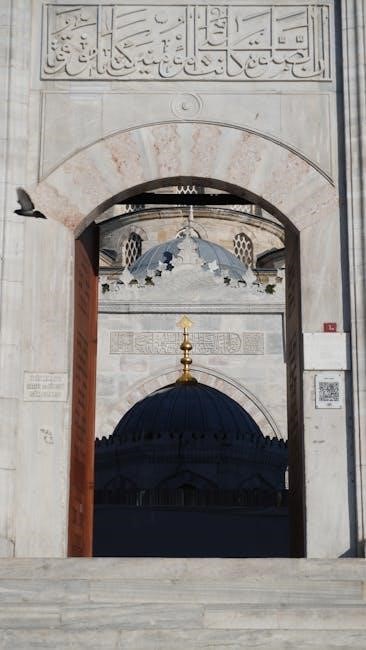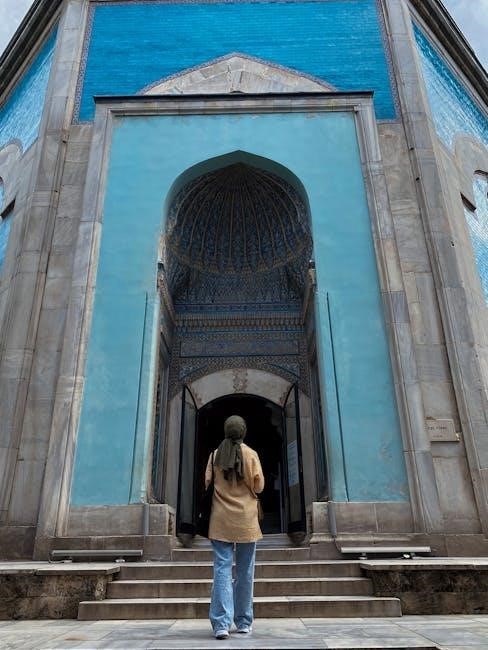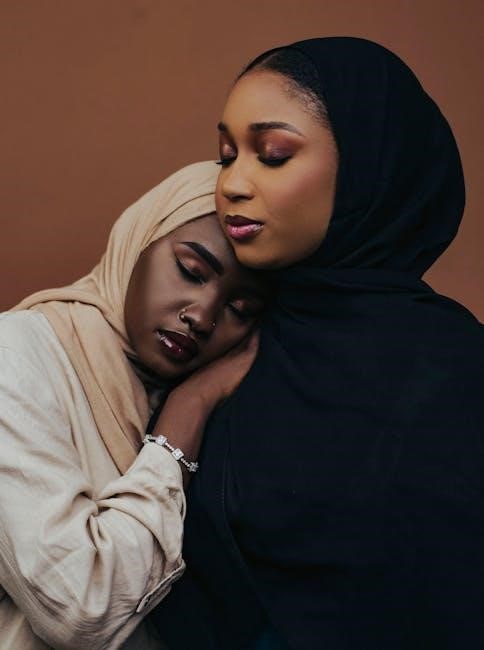This guide challenges political correctness, offering a bold exploration of Islam’s history, teachings, and controversies, aiming to provoke dialogue and provide an unfiltered understanding of the faith․
Understanding the Context of Political Correctness and Islam
Political correctness often shapes public discourse about Islam, limiting open discussions about its teachings and practices․ This guide challenges such constraints, emphasizing the need to address sensitive topics without fear of backlash․ By exploring controversial aspects of Islam, it aims to foster a balanced understanding, distinguishing between criticism and bigotry․ This approach encourages dialogue while respecting the faith, highlighting the importance of transparency in religious discussions․
The Importance of Addressing Controversial Topics

The Historical Roots of Islam and Its Expansion
Islam emerged in 7th-century Arabia, shaped by Muhammad’s teachings and the Quran․ Its expansion, driven by military conquests and cultural influence, spread rapidly across vast territories․
The Life of Muhammad and Controversies Surrounding His Actions
Muhammad, Islam’s founder, is revered as a prophet, but his life sparks debate․ Critics highlight his marriage to a young bride and treatment of opponents, while supporters emphasize his teachings on justice and compassion․ His dual role as spiritual and military leader complicates perceptions, fueling modern debates over his legacy and its implications for Islamic practices and societal norms today․
The Spread of Islam Through Military Conquest
Islam expanded rapidly after Muhammad’s death, with Arab armies conquering vast territories from Spain to Persia․ Critics argue this expansion relied on military force, often coercing conversions․ Proponents counter that Islamic rule brought stability and tolerance to diverse regions․ This period shaped Islamic identity and global influence, leaving a legacy of both admiration and controversy, particularly regarding the role of warfare in religious propagation and cultural transformation․
The Role of Jihad in Islamic Teachings
Jihad, a central Islamic concept, represents both a spiritual struggle and, controversially, holy war․ Its interpretation varies, fueling debates on extremism and religious duty․
Defining Jihad: Spiritual vs․ Militant Interpretations
Jihad, an Arabic term meaning “struggle,” is interpreted in Islam as both a spiritual and physical endeavor․ Spiritually, it represents the internal battle against sin and selfish desires․ Militantly, it has historically been associated with holy war, defending the faith, and expanding Islamic territory․ This duality sparks intense debate, with moderates emphasizing the spiritual aspect and extremists advocating for armed conflict․ Controversies arise from differing interpretations of Islamic texts and historical context․

Historical and Modern Examples of Jihad
Historically, jihad has been associated with Islamic expansion during the Rashidun Caliphate and the Conquests, framing military campaigns as religious duties․ In modern times, extremist groups like ISIS and Al-Qaeda hijack the term to justify terrorism, distorting its spiritual essence․ These actions, widely condemned by mainstream Muslims, highlight the volatile intersection of religious ideology and political violence, fueling global tensions and misunderstandings about Islam’s teachings on conflict and coexistence․

Sharia Law and Its Impact on Society

Sharia Law, derived from Islamic teachings, influences governance, justice, and daily life, shaping societal norms and legal frameworks, but its application often sparks debates on human rights and individual freedoms in modern societies․
Key Principles of Sharia and Their Application
Sharia, derived from the Quran and Sunnah, governs Muslim life, emphasizing justice, compassion, and moral integrity․ Key principles include ritual purity, prayer, charity, and fasting․ Its application spans legal, ethical, and social domains, guiding personal conduct and societal norms․ While intended to promote harmony, debates arise over its interpretation, particularly regarding women’s rights, freedom of speech, and compatibility with modern secular laws, fueling global controversies and political tensions surrounding its implementation․
Controversies Surrounding Sharia in Modern Societies
Sharia law sparks intense debates due to its strict punishments and perceived conflicts with modern human rights standards․ Critics highlight issues like women’s rights, freedom of speech, and minority protections․ Its implementation in secular societies often clashes with democratic values, fueling fears of cultural erosion․ Advocates argue it promotes justice and moral order, but extremist interpretations escalate tensions․ Balancing tradition and progress remains a global challenge, requiring open dialogue to address these complex issues․

The Status of Women in Islam
Debates surround women’s roles, with traditional interpretations emphasizing modesty and domesticity, while modern critics highlight inequalities in rights and freedoms within Islamic societies and teachings․
Women’s Rights in Islamic Teachings and Practice
Islamic teachings emphasize women’s dignity and rights, including property rights and consent in marriage․ The Quran and Sunnah outline protections for women, yet interpretations vary widely․ Historically, women held significant roles in Islamic societies, but practices often diverged from scriptural ideals․ Modern debates focus on reconciling religious principles with contemporary gender equality, challenging traditional norms while seeking balance between faith and progress․
Controversies Over Gender Roles and Equality
Controversies surround Islamic interpretations of gender roles, with debates over equality and rights․ Traditional views often emphasize male authority, while modernists advocate for reinterpretation․ Issues like inheritance, testimony, and domestic roles spark disagreement․ Critics argue Islamic teachings perpetuate inequality, while supporters cite Quranic principles of justice and fairness․ The balance between cultural practices and religious text remains a contentious issue in Muslim-majority societies and global discussions․
Islam and Its Relationship with Other Religions

Islam and Its Relationship with Other Religions
Islam’s relationship with other religions is complex, marked by historical interactions, theological debates, and modern efforts to foster mutual understanding and peaceful coexistence globally․
Islamic Views on Christianity, Judaism, and Other Faiths
Islam acknowledges Christianity and Judaism as Abrahamic religions, sharing common prophets like Abraham, Moses, and Jesus․ Muslims view Christians and Jews as “People of the Book,” deserving respect but considered to have corrupted divine revelations․ Islamic teachings emphasize the superiority of Islam over other faiths, often critiquing Christian doctrines like the Trinity and Jewish practices․ While coexistence is possible, theological tensions persist, shaping historical and modern interfaith dynamics․
Historical Conflicts and Modern Interfaith Relations
Historical conflicts between Islam and other religions, such as the Crusades and Muslim-Christian battles, have left deep scars․ Modern interfaith relations strive for dialogue, yet tensions persist due to theological differences and cultural clashes․ Efforts to promote mutual understanding are ongoing, but challenges remain in reconciling divergent beliefs and practices, highlighting the complex and often contentious nature of interfaith dynamics in both historical and contemporary contexts․
Modern Extremism and Its Links to Islamic Ideology
Modern extremism often draws on interpretations of Islamic texts, sparking debates about ideology’s role in violence and terrorism, while critics argue against oversimplifying complex issues․
The Rise of Radical Groups and Their Interpretations of Islam
Radical groups like ISIS and Al-Qaeda emerged, interpreting Islamic texts literally to justify violence․ They often distort historical context, creating ideologies that clash with mainstream Islamic teachings․ Their rise is linked to political instability and societal grievances, fueling extremism․ Critics argue their interpretations are unrepresentative of Islam, yet their actions shape global perceptions, sparking debates on ideology’s role in terrorism and the need for reform within Islamic discourse․
Addressing the Root Causes of Extremism
Addressing extremism requires understanding its root causes, such as poverty, lack of education, and political corruption․ These factors create fertile ground for radical ideologies to flourish․ Ideological warfare, countering extremist narratives, and promoting inclusive governance are critical; Education and economic opportunities can help divert individuals from radical paths․ Reforming interpretations of Islamic texts to align with modern values is essential to undermining extremist ideologies and fostering peace․ This approach demands global collaboration and cultural sensitivity․

Criticisms of Islam and Free Speech
Criticisms of Islam often spark debates over free speech, with some arguing for open discussion of Islamic teachings and others advocating for cultural sensitivity and respect․

The Debate Over Free Expression and Islamic Sensitivities
The debate over free expression and Islamic sensitivities often centers on balancing criticism of religious practices with respect for cultural and religious beliefs․ Critics argue that open dialogue is essential for reform, while others emphasize the need to avoid offending Muslim communities․ This tension has led to controversies over censorship, hate speech laws, and the limits of artistic and journalistic freedom in discussing Islam․
Examples of Controversy and Censorship
Controversies often arise when Islamic sensitivities clash with free expression․ For instance, the Charlie Hebdo cartoons and Rushdie’s Satanic Verses sparked global debates, protests, and violence․ Such incidents highlight the challenges of addressing religious criticism without inciting offense․ Censorship, whether self-imposed or enforced, frequently follows, raising questions about the limits of free speech and the role of cultural respect in public discourse․
Understanding Islam beyond political correctness requires open dialogue and education, fostering a nuanced perspective that acknowledges both its richness and controversies, promoting informed engagement with its teachings․
Understanding Islam Beyond Political Correctness
Exploring Islam without political correctness involves examining its historical and theological aspects critically․ This approach challenges common narratives, fostering a deeper understanding of Islamic teachings, cultural influences, and contemporary issues․ By addressing controversial topics openly, it encourages informed dialogue, helping to dispel misconceptions and promote a more nuanced view of Islam’s role in the modern world․
The Importance of Open Dialogue and Education
Open dialogue and education are crucial for fostering understanding of Islam’s complexities․ By encouraging honest discussions and providing accessible resources, individuals can gain a balanced perspective, moving beyond stereotypes and political correctness․ Education helps bridge gaps between cultures and belief systems, promoting mutual respect and informed engagement with Islamic traditions and their impact on global society․



